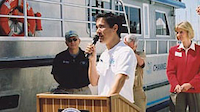
Chris Mobley
Sanctuary Superintendent
Chris.Mobley@noaa.gov
805-203-0613
Chris Mobley has been sanctuary superintendent since the fall of 2001. He began his NOAA career in 1987 as a commissioned officer in the NOAA corps, serving aboard the NOAA ship Malcom Baldrige as deck officer, working diver, and shipboard computer manager. He then worked for 10 years in NOAA Fisheries' Santa Rosa, California field office, focusing on the conservation and restoration of marine and freshwater fish habitat. As the Pacific salmon coordinator for NOAA Fisheries' Office of Protected Resources in Silver Spring, Maryland, Chris worked on policy, funding, and administration of Pacific salmon recovery efforts under the Endangered Species Act. During his career, Chris has had extensive experience in building partnerships and collaborating with state and federal agencies, local governments, tribes, businesses, non-profit organizations and user groups, often on highly controversial and contentious issues. Chris has a Bachelor of Arts degree in biology from Dartmouth College, a Master of Science degree in oceanography from the University of Washington, and an MBA from Sonoma State University.
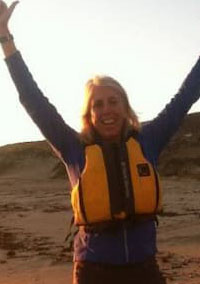
Julie Bursek
Team Lead for Education and Outreach
Unit Diving Supervisor
Julie.Bursek@noaa.gov
805-475-4583
Julie Bursek is the Education and Outreach Coordinator for Channel Islands National Marine Sanctuary. She also serves as the unit diving supervisor, managing all NOAA divers at the site and ensuring dive operations are conducted safely. Her portfolio of responsibilities include the development of education programs, exhibits, outreach products, and partnerships that increase awareness about the sanctuary's marine, cultural, and maritime heritage resources. Julie also currently manages volunteer coordination in partnership with Channel Islands National Park and regional whale watch operators. She's spent over 40 years conducting scientific investigations of the offshore, shallow subtidal and intertidal systems of the Southern California Bight including the Channel Islands. Her professional experience includes the development of exhibits at partner visitor centers, the development of citizen science monitoring programs to address resource protection issues and restoration priorities, and the coordination of scientific expeditions serving as a lead scientist and principal investigator. Julie holds a bachelor's degree in aquatic biology from University of California at Santa Barbara and a master's degree in marine biology from California State University Fullerton.
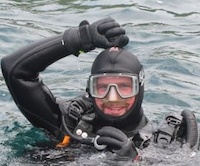
Chris Caldow
Research Coordinator
Chris.Caldow@noaa.gov
805-871-0284
Chris Caldow has been with NOAA since 2000 when he became a John A. Knauss marine policy fellow with the National Centers for Coastal Ocean Science's (NCCOS) Biogeography Branch at NOAA headquarters. Chris subsequently became chief of the Biogeography Branch, where he remained until coming west in July 2014 taking on the role of research coordinator at Channel Islands National Marine Sanctuary. Since 2014 Chris has built out the research capacity of the sanctuary through innovative partnerships with top tier academic institutions such as UC Santa Barbara, federal and state agencies as well as via fellowships, internships, and contracting. Chris and his team are working on high-visibility initiatives such as ocean noise, deep-sea exploration, habitat mapping, and human uses that are key to local sanctuary management but are also of regional and national significance. Chris obtained a Bachelor of Science degree in aquatic biology from the University of California, Santa Barbara in 1996 and a Master of Science degree in biology from the University of Houston in 2000 where he focused on understanding early life history of reef fish, marine protected area science, and climate change. Chris has over 60 publications in the peer-reviewed and technical scientific literature.

Elizabeth (Lizzie) Duncan
Research Ecologist
lizzie.duncan@noaa.gov
805-203-6242
Elizabeth (Lizzie) Duncan joined the CINMS research team as a 2017/18 California Sea Grant state fellow. During the course of her fellowship, Lizzie explored how to quantify the various human uses of the sanctuary to better understand fine-scale pressures on the resources CINMS is tasked to monitor and protect. This type of analysis will help CINMS quantify the ecosystem services the sanctuary provides to its stakeholders. As a federal employee on staff since February 2020, Lizzie is continuing her work on human use within the sanctuary, in addition to co-coordinating the Deep Sea Coral Research and Technology Program's (DSCRTP) West Coast Initiative (2018-2021). The West Coast is the focus of a multi-year field research initiative to better understand, conserve, and manage deep-sea coral and sponge ecosystems; outcomes of this initiative will have direct implications for sanctuaries, Essential Fish Habitat and Rockfish Conservation Area designations, offshore energy development, and new deep-sea technologies and exploration. Before joining CINMS, Lizzie completed both her Bachelor and Master of Science degrees in marine biology and biology from California State University, Long Beach. As an undergraduate, she first discovered her interest in the intersection of science and policy while interning for NOAA's Montrose Settlements and Restoration Program. As a graduate student, she was awarded the National Science Foundation Graduate Research Fellowship (NSF GRF) and the NSF East Asia and Pacific Summer Institutes Fellowship (EAPSI) for U.S. graduate students to study the responses of valuable marine species to anthropogenic-induced changes to the environment, aiming to one day pursue a career to help conserve the marine environment, protect the life it supports, and promote sustainable ocean use.
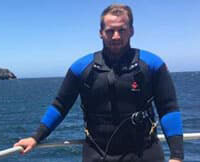
Ryan Freedman, Ph.D.
Research Ecologist
Ryan.M.Freedman@noaa.gov
805-203-6452
Dr. Ryan Freedman first joined Channel Islands National Marine Sanctuary's science team in March 2014 as a California Sea Grant fellow on a one-year appointment. He stayed with the CINMS team through a contract with Cardinal Point Captains before becoming a federal employee on staff in February 2020. His research background covers a wide range of topics; in particular he is interested in addressing coastal management concerns using a variety of spatial and quantitative techniques. He holds a Bachelor of Science degree from the Rosenstiel School of Marine and Atmospheric Science at the University of Miami where he double majored in biology and Marine Science with minors in Chemistry and geography. During his undergraduate career, he worked with various faculty members on several projects including mapping coral community decline, creating 3D maps of stromatolites, and modeling manta ray behavior off the mid-Atlantic coast. He had the opportunity to analyze spatial datasets for the Deepwater Horizon oil spill while at NOAA's Southeast Fisheries Science Center. He also spent time with the Oceans Research group in South Africa, where he assisted in the tracking and data analysis of white shark movements as an intern. In 2011, he joined the Shark Lab at California State University Long Beach, where his master's degree work focused on analyzing movements of juvenile sharks and fishes to assess the landscape connectivity, habitat use, and effectiveness of restored estuaries. In 2013, he participated in the NOAA Recruiting, Training and Research (RTR) program's resource dynamics workshop, helping to apply new population modeling techniques to the Gulf sturgeon population and surveying regional stakeholder interests. In 2019 he completed his doctorate degree at the University of California, Santa Barbara where his research quantified human impacts to sanctuary resources focusing on climate change and cetacean ship strikes. Ryan is enthusiastic about working alongside resource managers and scientists to address the needs of the sanctuary.
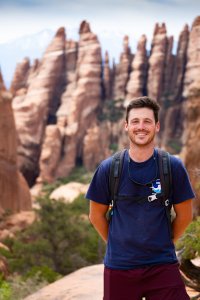
LTJG Daniel Lucas
Vessel Operations Coordinator / NOAA Corps Officer
voc.cinms@noaa.gov
805-203-0620
After completing his first assignment as a NOAA Corps Officer aboard the NOAA Ship Nancy Foster, LTJG Lucas is now part of the Channel Islands NMS team! As the Vessel Operations Coordinator for the sanctuary, Daniel oversees research operations, planning and logistics, and often lends a hand aboard the R/V Shearwater and R/V Minke. Before NOAA, Daniel spent time aboard multiple tall ships, sailing as a deckhand aboard the S/S Corwith Cramer, the Schooner Adventuress, and the Hudson River Sloop Clearwater. His time spent in Glacier National Park as an interpretive boat captain also contributed to his enthusiasm for operating ships in and around protected natural areas. Daniel holds a Bachelor of Science in Chemistry and Environmental Studies from Warren Wilson College, located in Asheville, NC. During his last semester, he worked as an independent research consultant for the NASA Develop National Program, while also managing a flock of sheep on a livestock farm!
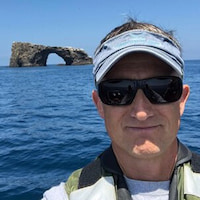
Sean Hastings
Policy, Information and Management Officer
Sean.Hastings@noaa.gov
805-203-6475
Sean joined Channel Islands National Marine Sanctuary in 1997 and serves as the site's Policy, Information and Management Officer. He is responsible for the development of policies and programs to address industrial, military, commercial and recreational uses and impacts in and around the sanctuary. He also handles emergency response, enforcement, permits, community relations, and is a liaison to the media. Sean helped to create the marine protected area network to restore local fish and invertebrate populations and habitats in the sanctuary, and helped the state of California to do the same in state waters on the mainland. With a multi-agency coalition and community support he founded Protecting Blue Whales and Blue Skies, a voluntary Vessel Speed Reduction program, and moved international commercial shipping lanes to protect endangered whales. Sean raises to raise the sanctuary's profile locally, nationally, and internationally through astute communication, media, and negotiation skills. He has forged trusted partnerships with academia, government agencies, non-government organizations, and sanctuary user groups. Sean has a Master of Marine Affairs degree from the School of Marine Affairs, University of Washington, and a Bachelor of Arts in environmental studies, University of California at Santa Cruz and was a Presidential Management Fellow. Sean is an avid outdoorsman who surfs, boats, paddles, scuba and free dives, fishes, hunts, skis, and snowboards throughout the West.

Michael Murray
Deputy Superintendent for Programs
Michael.Murray@noaa.gov
805-203-6273
As deputy superintendent for programs since 2008, Michael Murray assists with overall management of the sanctuary and works to integrate and enhance resource protection, research and monitoring, education and outreach, cultural heritage, and maritime heritage program areas. Michael first joined CINMS in 1999, and since then has enjoyed helping to connect the local community with management of the sanctuary through his ongoing role as coordinator of the Sanctuary Advisory Council. He also leads sanctuary efforts to engage with local indigenous Chumash Community members. Prior to joining CINMS, Michael worked as a planner for NOAA's Office of National Marine Sanctuaries from 1995-1999 in Seattle, Washington on a feasibility study for a proposed national marine sanctuary site. Michael has also studied the management of marine protected areas (MPAs) since 1996, and was active in MPA planning for Puget Sound in Washington from 1997-1999. Additionally, Michael serves as a member of the editorial board for MPA News, a long-standing international newsletter. Michael holds a master's degree in environmental studies with an emphasis in policy and planning from California State University, Fullerton and a bachelor's degree in business administration from California State University, Long Beach. He is also a 2016 graduate of NOAA's Leadership Competencies Development Program. Raised in Hawaii and a life-long surfer, Michael enjoys living on the coast of Santa Barbara, California, the unceded lands of Chumash People.

Rebecca Young
Program Support Specialist
Rebecca.Young@noaa.gov
805-203-6396
Rebecca Young joined Channel Islands National Marine Sanctuary in May 2000. As program support specialist she provides core operations support in the areas of budget planning and tracking, financial coordination, procurement, administration, and office management. Rebecca holds a Bachelor of Science degree in aquatic biology from the University of California Santa Barbara. In her free time Rebecca enjoys being in the water swimming or playing water polo. Additionally you can find her spending time with dogs at home, the dog park, and volunteering at the county animal shelter.
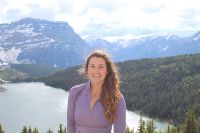
Anastasia Kunz
Marine Resource Protection Program Coordinator, California Marine Sanctuary Foundation
anastasia.kunz@noaa.gov
Anastasia Kunz is a spatial scientist with expertise in marine conservation and resource protection. She currently serves as a Program Coordinator and Data Analyst for the Marine Resource Protection Team at the California Marine Sanctuary Foundation and maintains a NOAA affiliation through the Channel Islands National Marine Sanctuary (CINMS) in Santa Barbara. Anastasia’s work leverages technology and remote sensing to enhance resource management and conservation efforts along the California coast. Her research focuses on three main areas: passive acoustic monitoring across NOAA’s National Marine Sanctuaries, deploying innovative technologies to support enforcement partners in California, and advancing marine mammal conservation. At CINMS, she analyzes human use patterns using AIS data across the sanctuary, coordinates the CINMS Aerial Whale Survey Program to monitor large whales along the shipping lanes, and conducts local population dynamics studies using a variety of datasets to inform conservation strategies and support the Voluntary Vessel Speed Reduction Program. She holds a Bachelor’s degree from UCLA and a Master’s degree in Environmental Science and Management from the Bren School at UCSB, where she specialized in conservation planning and marine resource management. Her previous work with NASA DEVELOP involved applying remote sensing and NASA Earth Observations to address environmental and public policy challenges.

Jennifer Brown, Ph.D
Project Scientist, ECOS Consulting
Jennifer.Brown@noaa.gov
831-583-8719
Jennifer Brown began helping Channel Islands National Marine Sanctuary in 2015 as a contracted project scientist to develop a process for selecting key monitoring indicators and applying them to condition assessments of sanctuary resources. She is helping develop and coordinate ecosystem assessments at both local and regional levels working with partners including the California Current Integrated Ecosystem Assessment and Marine Biodiversity Observation Network. These ecosystem models and condition reports support the sanctuary's needs for integrated monitoring and ocean observing information as well as regional data summaries. Jennifer first began working with NOAA's Office of National Marine Sanctuaries in 2000 as a graduate student intern - resulting in a Marine Sanctuary Conservation Series report summarizing marine zoning in Monterey Bay National Marine Sanctuary (MBNMS). She became a contractor for MBNMS in 2004 on a project characterizing 'special status species' in the sanctuary. She has since worked for MBNMS as an ecosystem scientist for the Sanctuary Integrated Monitoring Network (SIMoN) on projects including the Marine Protected Area Action Plan, Sanctuary Ecologically Significant Areas, and condition reports. Jennifer obtained a Bachelor of Science degree in biological science from the University of California, Los Angeles in 1996 and a doctorate degree in ecology and evolutionary biology from the University of California, Santa Cruz in 2003 after completing a dissertation titled "An Evaluation of the Nursery Role of Estuaries for Flatfish Populations in Central California."

Julia Chavarry, Ph.D.
2026 CINMS California Sea Grant State Fellow
julia.chavarry@noaa.gov
Dr. Julia Chavarry joins the CINMS team as a 2026 California Sea Grant Fellow. She is broadly interested in ocean conservation and is trained as a biological oceanographer and educator. At seven years old, Julia boldly declared she was going to be a marine biologist and has been steadfast in her pursuit ever since, having spent over 100 days at sea and more than 60 hours scuba diving to conduct her research. Some of her more notable research projects include quantifying the exposure of anchovies to microplastics, describing the food web dynamics of deep-sea gelatinous zooplankton (‘jellies’), and investigating strategies for maximizing fish stock populations through the incorporation of a no-take marine reserve. Throughout her career, Julia has shared her love of the ocean with others as a teaching assistant and outdoor educator. She is skilled in developing coursework for classroom, laboratory, and remote settings and has led immersive fieldwork excursions for students of all backgrounds and ages. Julia has also worked alongside scientific illustrators, photographers, non-profit organizations, and policy organizations like the Deep Ocean Stewardship Initiative, to share and advance scientific research. Julia double majored in Earth & Planetary Sciences and Behavioral Biology at Johns Hopkins University and graduated with a Ph.D. in Oceanography from the Scripps Institution of Oceanography. She is eager to support CINMS programs that will protect the sanctuary’s unique natural and cultural resources.

Manuela Diaz
Ocean Access Program Coordinator, California Marine Sanctuary Foundation
manueladiaz@ucsb.edu
As a collaborator with the California Marine Sanctuary Foundation (CMSF), Manuela serves as the Ocean Access Program Coordinator for a social science research initiative that explores the social dimensions of ocean access across California’s coastal counties, with a particular focus on marine protected areas (MPAs) and the state’s National Marine Sanctuaries. Her work focuses on conducting research to better understand how people — particularly those from California’s coastal communities — use, value, and experience coastal and ocean spaces. These insights help inform coastal management and initiatives within the sanctuary, as well as at the state and federal levels.
Manuela holds a Master’s Degree in Environmental Science and Management with a specialization in Coastal Resources Management from the Bren School at the University of California, Santa Barbara, and a Bachelor’s Degree in Design from the Pontifical Catholic University of Chile. She has worked as an experience and strategic design consultant, applying human-centered design methodologies to develop strategic solutions that help organizations across diverse industries increase their tangible value for clients and employees, while improving operational efficiency and optimizing processes. Her experience spans from designing new value propositions and customer experiences to developing communication strategies, as well as graphic and audiovisual design.
Manuela also worked as a consultant at the Chile California Council, promoting collaboration and knowledge sharing between Chile and California to support the sustainable development of both regions. Her work focused on communications and supporting projects related to coastal conservation and management, such as applying lessons from California’s coastal policies and initiatives—including the Marine Life Protection Act—to local contexts in Chile. She also collaborated with NGOs on stakeholder analysis and the human dimensions of coastal management in southern Chile. She is passionate about designing interdisciplinary and innovative solutions that integrate the human dimension into coastal management and conservation, creating approaches that benefit both people and the environment while fostering a mutually beneficial relationship between communities and coastal ecosystems.
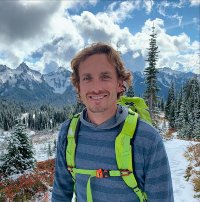
Luke Dutton
Vessel Captain, Contractor with Cardinal Point Captains
lucas.dutton@noaa.gov
Luke joined the Channel Islands National Marine Sanctuary team in June 2022. Luke was born in Minnesota, and moved to Sydney, Australia when he was very young. Luke spent all of his childhood immersed in the ocean off the east coast of Australia. He obtained his open water and advanced scuba license at the age of 16 and spent many years diving up and down the coast. He began his career in the ocean when he became a dive master on the Great Barrier Reef, sharing his love of the ocean with visitors from across the globe. Since moving back to the United States he has furthered his career working on the water firstly on Lake Tahoe and eventually at the Channel Islands working for Island Packers for over 12 years as a lead captain and assisting the Channel Islands National Park Service with the Channel Islands Live Dive program educating schools across the nation on the wonders of the local waters. Luke is very excited to be a part of the team at NOAA within Channel Islands National Marine sanctuary on the R/V Shearwater.
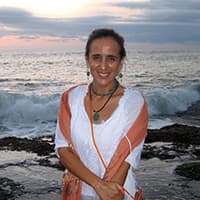
Rocío Lozano-Knowlton
President, MERITO Foundation
Rocio.Lozano@noaa.gov
805-729-0442
Rocío Lozano-Knowlton serves as president of the MERITO Foundation, and was coordinator of the MERITO Academy Program for NOAA Channel Islands National Marine Sanctuary since 2005. Rocío has a Bachelor of Science degree in physical oceanography from UABC in Ensenada Mexico, and a Master of Science degree. in marine resource protection from Herriot Watt University in Scotland. The MERITO program builds stewardship for national marine sanctuaries, raises awareness of ocean issues, and increases the interest of STEM underrepresented youth in science and resource protection by integrating Earth & ocean science into public education and extended learning programs. Between 1996-2005 Rocío co-owned and managed a scuba diving and eco-tourism business in South Baja, Mexico and worked as a marine resource protection consultant for non-profit marine conservation organizations in the Gulf of California and the Baja California Peninsula.
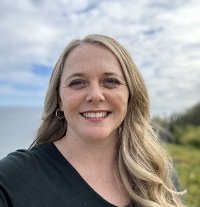
Stacey Lydon
Director of Organizational Advancement
California Marine Sanctuary Foundation
stacey@californiamsf.org
805-680-8734
Stacey Lydon joined the California Marine Sanctuary Foundation (CMSF) in 2023. Her career has focused on creating impact for individuals, organizations, and communities. She has spent 20 years working in program management, outreach, and fundraising for universities and non-profit organizations with a global reach. At CMSF, Stacey concentrates on building philanthropic partnerships, strategic planning, and communications. She also supports collaborative efforts between Channel Islands National Marine Sanctuary and CMSF. Stacey holds a Master's Degree in International Economics from the School of Global Policy & Strategy at UC San Diego, and a Bachelor's Degree in International Development Studies and Political Science from UCLA.

Captain Zac Montgomery
Vessel Captain, Cardinal Point Captains
Zacary.Montgomery@cpcperforms.com
Zac was born in Santa Barbara and raised on the central coast. He was introduced to boating at a very young age, and has spent much of his life exploring the waters and islands off the California Coast. He started working around the Channel Islands at the age of 15 as a deckhand, naturalist, and eventually a captain on one of the Island Packers vessels. After college he moved to Hawaii where he spent roughly six years working as a captain for various dive, snorkel, and whale watching boats. Working with NOAA has always been a dream for Zac, and he was excited to take the opportunity offered to join the sanctuary team through a contract with Cardinal Point Captains. In his spare time Zac is usually with his wife and daughter either traveling or doing something outside.

Jess Morten
Resource Protection Specialist, California Marine Sanctuary Foundation and Greater Farallones Association
Jessica.Morten@noaa.gov
Jessica (Jess) Morten first joined the team at Channel Islands National Marine Sanctuary in 2016 as a California Sea Grant fellow, assisting with sanctuary advisory council operations and Resource Protection Department projects. She now serves as the Director of Marine Resource Protection at the California Marine Sanctuary Foundation, where she oversees and coordinates the resource protection projects that the foundation manages, including the Protecting Blue Whales and Blue Skies Program, large whale aerial surveys, Marine Monitor (M2) shore-based radar systems, and the eFINS data collection app. For the last 9+ years, Jess has also served as a Resource Protection Specialist Affiliate with CINMS and the other national marine sanctuaries in California to analyze data and work with researchers, managers, and industry to implement protections for whales along the U.S. west coast. Her prior background includes population and behavioral field research work focused on humpback, North Atlantic right, and killer whales as well as policy research focused on evaluating impacts associated with fishery management strategies. Jess holds an M.A. in International Environmental Policy from the Middlebury Institute of International Studies and a Bachelor's degree in Environmental Science from Skidmore College.

Jai Ranganathan
Marine Ecologist, Cardinal Point Captains
jai.ranganathan@noaa.gov
805-697-2932
If there is one thing you need to know about Jai Ranganathan, dear reader, it is that he is enthusiastic. And just what might he be enthusiastic about? So many things! But especially about science, science communication, and pomegranates (especially, especially pomegranates). Jai is an ecologist and his Science Journey has exuberantly taken him many places: to Wesleyan University for a bachelor's degree in geology, to the University of Minnesota for a master's degree in conservation biology, and to Stanford University for a doctorate in biological sciences. Since 2020, Jai has been building internet-based tools to improve science communication capacity for several NOAA programs. For Channel Islands National Marine Sanctuary in particular, Jai has been heavily (and enthusiastically) involved in building a handy-dandy web-based portal for displaying Condition Report information.
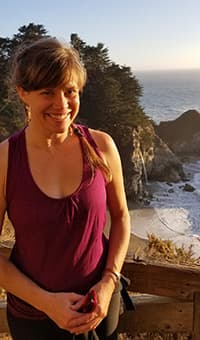
Jennifer (Jenny) Selgrath, Ph.D.
Spatial Ecologist and Social Scientist, Cardinal Point Captains
Jennifer.Selgrath@noaa.gov
805-475-4587
Dr. Jennifer (Jenny) Selgrath has worked as a social-ecological researcher with Channel Islands National Marine Sanctuary's science team since July of 2020. She is passionate about incorporating transdisciplinary spatial and social-ecological tools into research, monitoring, conservation, cultural preservation, and collaborative management of coastal ecosystems. She focuses on human dimensions of the sanctuary, including ocean access, subsistence fishing, climate impacts, and cultural benefits, on and deep-sea coral habitats. Prior to joining the sanctuary team, she was a postdoctoral scholar at Stanford University's Hopkins Marine Station where she integrated historical ecology and local ecological knowledge to assess biodiversity changes in Monterey Bay over the past two centuries. She focused on coastal species including sea otters, sea urchins, kelp, and black abalone. As a post-doc she also assessed the adaptive capacity of coastal fishing communities to respond to impacts from climate change. Jennifer completed her doctorate degree at the University of British Columbia's Institute for Oceans and Fisheries. During her PhD she worked in partnership with Project Seahorse, the Landscape Ecology Lab, and Zoological Society of London (ZSL)-Philippines. Her doctoral research focused on understanding long-term and spatial changes in the sustainability of small-scale fisheries, the influence of fisheries governance, and the impacts of fishing and other stressors on the spatial resilience of coral reefs. Jennifer earned her Master of Science degree in Biology from San Diego State University and her bachelor's degree from Wesleyan University where she double majored in Dance and Earth & Environmental Science. She is a former AmeriCorps volunteer and a former Fulbright Scholar (Philippines).

Vanessa Van Deusen
Marine Ecologist, Contractor with Cardinal Point Captains
vanessa.vandeusen@noaa.gov
Vanessa joined the CINMS research team in the fall of 2023. Her work at CINMS supports various research projects spanning topics such as animal movement, pelagic fisheries, and monitoring. Vanessa graduated from Barnard College in 2018 with a BA in Environmental Science. While at Barnard, Vanessa worked as a fellowship student at Bowdoin College's Coastal Marine Laboratory where she studied invasive green crab diets within the Gulf of Maine. Vanessa then worked as a research assistant in the Invertebrate Zoology Department of the American Museum of Natural History, studying anemone phylogenetics. In 2023, Vanessa completed a master degree in biology at San Diego State University (SDSU). Her thesis examined the effects of ocean warming on the predator-prey interaction between California spiny lobsters and sea urchins. While at SDSU, Vanessa also contributed to studies that monitored eelgrass health, monitored eelgrass community structure, characterized California spiny lobster diet composition, and quantified California spiny lobster reproductive capacity. She is excited to be part of the CINMS research team.

Erin Ristig
Marine Resource Protection Program Coordinator,
California Marine Sanctuary Foundation
erin.ristig@noaa.gov
Erin Ristig joined the Channel Islands team in 2019. As an affiliate through the California Marine Sanctuary Foundation (CMSF), she works on marine resource protection, focusing primarily on the eFINS data collection and reference system. She coordinates with marine wardens and partner organizations to streamline design and increase utilization of the electronic app system, working to improve the user experience for collection of more accurate enforcement data in California. In her role she also creates reports and communication materials to convey the utility of enforcement technologies to partner agencies. She is passionate about design and adoption of data collection technology that can help enhance marine conservation and fisheries management. In addition to her work with the Channel Islands team, Erin works with NGOs on a variety of marine projects. Her experience includes fisheries data collection program design, capacity-building and facilitation, and community-driven conservation in international settings. Erin holds a Master of Environmental Science and Management degree in Coastal Marine Resources Management from the Bren School of Environmental Science & Management at UC Santa Barbara and a Bachelor of Arts degree in Environmental Analysis and Spanish from Claremont McKenna College.

Grace Kumaishi
Marine Ecologist, Contractor with Cardinal Point Captains
grace.kumaishi@noaa.gov
Grace Kumaishi joins the CINMS research team as the Sanctuary Watch implementation lead for the West Coast and Pacific Islands regions. She holds a B.S. in Ecology, Behavior, and Evolution from UCLA and a Master of Environmental Science and Management (M.E.S.M.) from the Bren School at UCSB, where she specialized in conservation planning and coastal marine resource management. Her past professional experience includes laboratory and field research focused on zooplankton composition, marine predator diet, and breeding seabird ecology on Southeast Farallon Island. Grace’s graduate work focused on data analysis and geospatial modeling of human wildlife conflict in the face of global climate change with prominent NGO partners including The Nature Conservancy and Conservation International. As a 2023 California Sea Grant Fellow with MBNMS and CINMS, Grace worked to develop and co-author climate vulnerability assessments, as well as support other climate science, research, and operational efforts at both sites and ONMS Headquarters. Grace currently lives in Santa Cruz, California, where she can often be found exploring local beaches, trails, and farmers’ markets with her loved ones.

Becca Tucker
California Marine Sanctuary Foundation
becca@californiamsf.org
As an affiliate through the California Marine Sanctuary Foundation (CMSF), Becca Tucker is the Corporate Engagement Director for the Blue Whales Blue Skies (BWBS) Program, where she advances the ambassador effort to engage more logistics, freight forwarders, brands and product companies that rely on shipping carriers enrolled in the BWBS program. Becca brings more than a decade of business development experience with a particular focus on renewable energy development, corporate environmental management and communications. Becca holds a Master’s Degree in Environmental Science and Management from the University of Santa Barbara California's Bren School, and a Bachelor’s Degree in U.S. History and Environmental Studies from Bowdoin College.

Ryan Logan, Ph.D.
Interim Network Coordinator, U.S. Animal Telemetry Network,
ryan.logan@noaa.gov
Dr. Ryan Logan joined the Channel Islands National Marine Sanctuary's research team in the fall of 2024 as the manager for the Northeast Pacific Acoustic Telemetry (N-PAcT) Node. Ryan's research background covers a range of topics centered around understanding animal behavior, movements, and ecology to improve conservation and management, with a specific focus on coastal and pelagic gamefish and sharks. He completed his BS in marine biology at the University of Hawaii at Manoa where he interned at the Hawaii Institute of Marine Biology researching hammerhead shark feeding behavior. Next, Ryan interred at Mote Marine Laboratory where he studied shark behavior and physiology. Ryan joined the Shark Lab at California State University Long Beach in 2014 for his Masters, where he used acoustic telemetry to study gamefish movements around a large artificial reef in southern California. He then went on to complete a PhD at Nova Southeastern University's Guy Harvey Research Institute where his research focused on marlin and sailfish movements, behavior, and foraging ecology in the Eastern Tropical Pacific using a range of electronic tags and biologgers. Before joining the CINMS, Ryan completed a postdoc at the CSULB Shark Lab where he focused on how white shark movements changed throughout ontogeny. Ryan looks forward to building partnerships and collaborating with state and federal agencies, local governments, tribes, businesses, non-profit organizations and other user groups as Node Manager for N-PAcT.

Kady Lyons, Ph.D.
N-PAcT Node Manager, Cardinal Point Captains
kady@californiamsf.org
Dr. Kady Lyons joined the California Marine Sanctuary Foundation in 2026 as data manager of the N-PAcT node. Prior to this role, she was a research scientist in the private sector studying shark and ray biology, with emphasis on movement ecology using acoustic telemetry. Kady’s research interests focus on ecological physiology, the study of connecting how animals’ adaptations enable them to move through and interact with their environment. Kady’s passion for marine-based research is anchored in her southern Californian roots and many trips to the beach playing in tide pools, snorkeling and scuba diving from a young age.

Emily Meese, Ph.D.
Postdoctoral Scholar, Marine Science Institute, UC Santa Barbara
emily.meese@noaa.gov
Dr. Emily Meese joined the CINMS team as a postdoctoral scholar in October 2024. In collaboration with the Caselle Lab at UC Santa Barbara, her work focuses on analyzing acoustic and satellite data on fish and shark movements in and around US Sanctuaries. Throughout her research, she has always been interested in understanding habitat suitability across varying spatiotemporal scales. Emily completed her Bachelor of Science in Marine Biology at California State University, Long Beach where her honors thesis determined how environmental conditions influence the habitat selection of resting elasmobranchs at Catalina Island. In 2019 she completed her Master of Science in Biology at the California State University Long Beach Shark Lab, focusing on the fine-scale movement patterns and behaviors of California horn sharks. She then completed her Ph.D. in Marine Biology at Texas A&M University at Galveston in 2024 where her dissertation employed a variety of advanced stable isotope techniques to explore the food web ecology of fishes in a subtropical estuary. Emily is excited to be part of the CINMS team where she can work alongside resource managers and academics to contribute to the needs of US marine sanctuaries.

Sandra Traverso
Marine Ecologist, California Marine Sanctuary Foundation
sandra.traverso@noaa.gov
Sandra joined the Channel Islands National Marine Sanctuary team as their 2025 California Sea Grant fellow. She holds a Master of Biology from Cal Poly Humboldt, where her research focused on applied kelp forest restoration. Previously, Sandra worked to inspire marine stewardship and conservation through education and outreach as a Marine Science instructor and aquarist at the Catalina Island Marine Science Institute. She earned a bachelor's degree in marine biology from the University of California Santa Cruz, where she worked as a research assistant studying intertidal ecology. As a Sea Grant fellow, Sandra expanded her outreach and education experience, connected with the local community, and supported research and resource protection efforts. Sandra is currently contracting with the California Marine Sanctuary Foundation to support Channel Islands National Marine Sanctuary research, including coordinating the N-PAcT node. She contributes to the network by supporting the tagging of animals, maintaining receivers within the sanctuary and supporting data management for the node.

Lisa Krigsman
Research Operations Specialist, Cardinal Point Captains
lisa.krigsman@noaa.gov
Lisa Krigsman joined the CINMS team in fall of 2023. Her work supports the on-going deep-sea coral, sponges, and benthic fish research that is ongoing within West Coast waters. She started her NOAA career in 2007 as a California State Sea Grant Fellow at the Marine Protected Area Center then moved to the Early Life History team at NMFS at the Southwest Fisheries Science Center. In 2008 she joined the Groundfish Team where she worked as the liaison between USGS and NMFS for the California Seafloor Mapping Program and later the Deep Sea Coral Research and Technology Program's West Coast Initiative. Lisa's work with the Sanctuary system includes the Monterey Bay National Marine Sanctuary's California salmon outreach project, California Salmonscape, with artist Ray Troll, and she is a volunteer with TeamOCEAN. Lisa holds a Bachelor's degree from the University of California, Santa Cruz and her Master of Science degree from San Francisco State University. She also spent a year studying in Australia at the University of Queensland. When not analyzing video of the seafloor Lisa is riding her bike, walking her dog, running in the forest, volunteering with Santa Cruz Sunrise Rotary, and helping her community in various capacities.
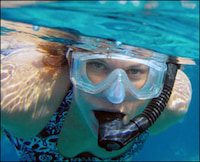
Claire Fackler
National Education Liaison and National Volunteer Coordinator, NOAA Office of National Marine Sanctuaries
Claire.Fackler@noaa.gov
805-893-6429
Claire Fackler has been working for NOAA's, National Ocean Service since 1999. Prior to that, she did contract work for the National Geographic Society, then moved to NOAA to assist in the education and outreach elements of the Sustainable Seas Expedition until 2001. She has worked as the National Education Liaison for NOAA's Office of National Marine Sanctuaries since 2002, in addition to becoming National Volunteer Coordinator since 2015. Her work helps bring the ocean into America's classrooms, as well as to inspire ocean and climate literacy and conservation through national marine sanctuaries. She works with various partners on national and regional educational programs that enhance public awareness, understanding, and appreciation of the marine environment.
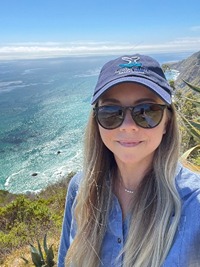
Laura Ingulsrud
Policy Analyst
West Coast Region, NOAA Office of National Marine Sanctuaries
laura.ingulsrud@noaa.gov
831-583-8857
Laura Ingulsrud joined NOAA's Office of National Marine Sanctuaries (ONMS) as Policy Analyst for the West Coast Regional Office (WCRO) in 2022. She was heavily involved in the designation process for Chumash Heritage National Marine Sanctuary, and continues to support the newest sanctuary on the west coast. Laura works with all six west coast national marine sanctuaries, especially on policy, resource protection, management, fisheries coordination, and large-scale conservation issues. Before becoming a Policy Analyst with the WCRO, Laura worked as a contractor for the WCRO, NOAA Fisheries Office of Protected Resources (OPR), and CINMS in various capacities. She completed the Knauss Marine Policy Fellowship in 2021 as the Marine Mammal Conservation Fellow for OPR, where she focused on North Atlantic right whale vessel strike issues, worked on "Guidelines for Safely Deterring Marine Mammals", and served on NOAA Science Council's Ecosystem Indicators Working Group. Laura graduated with a Master of Environmental Science and Management degree from the Bren School at the University of California, Santa Barbara (UCSB), where she specialized in Coastal Marine Resources Management and Conservation Planning with a focus in Environmental Data Science. For her master's thesis, Laura was project manager of a 4-person team working to create a marine spatial plan and economic valuation to reduce vessel strikes with sperm whales off Dominica. Laura was also an Ocean Health Index Fellow with the National Center for Ecological Analysis and Synthesis and served on the UCSB Coastal Fund Board of Directors. Before grad school, she worked as an environmental consultant, sailing instructor, marine mammal stranding volunteer, and intern for the Environmental Defense Center in Santa Barbara, and guided on Mt. Fuji in Japan for a season. Laura also holds a Bachelor of Arts in Environmental Studies and a minor in Professional Writing from UCSB.

Lindsey Peavey Reeves, Ph.D.
Senior Scientist and West Coast Region Sanctuary Soundscape Monitoring Project Coordinator,
NOAA Office of National Marine Sanctuaries Conservation Science Division and National Marine Sanctuary Foundation
Lindsey.Peavey@noaa.gov
619-808-7730
Lindsey first joined NOAA Sanctuaries in 2016, bringing a diverse background spanning marine ecology, place-based conservation, and cumulative impacts assessment to the CINMS research team. After earning a Bachelor of Science in marine science from the University of Miami, Lindsey worked in binational community-based marine conservation for six years in Southern California and Northwest Mexico. Lindsey's graduate research focused on the ecology of large marine vertebrates [marine mammals, sea turtles, birds, and fish] that migrate long distances to feed and breed. After completing a master's degree at Duke University and a doctorate degree at UC Santa Barbara, both in Environmental Science & Management, Lindsey worked on advancing dynamic ocean management with NOAA's Southwest Fisheries Science Center as a California Sea Grant Fellow. Lindsey is currently a Senior Scientist at the National Marine Sanctuary Foundation and leads long-term passive acoustic monitoring along the west coast that is implemented by a large, multi-sector group of partners. She works across disciplines to inform the management of protected areas and species, and in support of resilient communities and ecosystems for future generations.